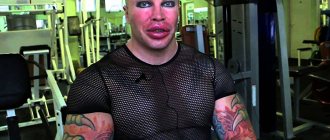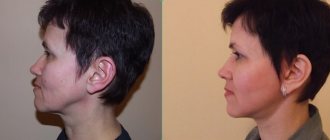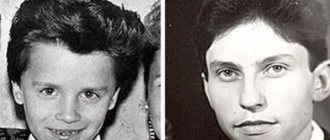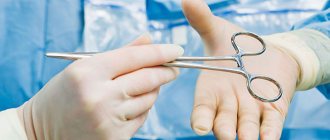Malakhov Alexander Andreevich, reviews found: 1, work experience: 11 years
Specializes in:
- liposuction;
- abdominoplasty;
- navel surgery;
- brachioplasty;
- intimate plastic surgery;
- blepharoplasty;
- face lift (circular face lift SMAS);
- forehead and eyebrow lift;
- facial lipofilling;
- breast enlargement, reduction and lifting;
- areola correction;
- treatment of gynecomastia in men.
Malakhov Alexander Andreevich
Plastic surgeon. Studied at the 1st Moscow State Medical University named after. I. M. Sechenov, specialty “General Medicine”. Completed residency in plastic surgery.
Plastic surgeon Malakhov A. A. is a participant in many training seminars and international conferences. He has many medical licenses and certificates, in particular, on studying methods of aesthetic correction, completing a training course on the use of products from the Restylane line.
Malakhov Alexander Andreevich works at the international surgical center “The Platinental”, where he provides consultations on various issues of plastic surgery. He specializes in plastic surgery of keloids, post-traumatic, postoperative and hypertrophic scars, laser and surgical removal of skin tumors (pigmented nevi, papillomas, fibromas, keratomas, atheromas, hemangiomas, lipomas and warts). In addition, he performs rhinoplasty, lipofilling, laser rejuvenation, botulinum therapy, resurfacing and contouring.
Clinic:
- Inteko-clinic Clinic of plastic surgery and cosmetology
- The Platinental International Surgical Center
Prices for services:
| Plastic surgery | ||
| Face-to-face consultation | 1.500 — 2.000 rub. | |
| Scar treatment (surgical) | 12.500 — 54.000 rub. | |
| Liposuction | 25.000 — 95.000 rub. | Nano-liposuction XP-2 Focus. |
| Lipofilling | 24.000 — 120.000 rub. | |
| Rhinoplasty | 150.000 — 180.000 rub. | Including rhinoseptoplasty (with septum correction). |
| Plastic surgery of the tip of the nose | 80.000 rub. | |
| Revision rhinoplasty | 180.000 rub. | |
| Cosmetology | ||
| Aqualix | 8.300 — 38.000 rub. | 1 - 5 zones. |
| Biorevitalization | ||
| IAL System | 10.500 — 12.500 rub. | 0.6 ml - 1.1 ml. |
| ACP | 14.000 rub. | 1.1 ml. |
| Jalupro | 12.200 rub. | 1 percent |
| Viscoderm | ||
| 1,6% | 11.200 — 28.560 rub. | 1.5 - 4.5 ml. |
| Botulinum toxin | 8.000 — 26.500 rub. | Botox/Dysport/Xeomin, per area. |
| Treatment of hyperhidrosis | 35.000 rub. | Botox/Dysport. Laser treatment of hyperhidrosis Nd:YAG - armpit area (one side) - RUB 33,000. |
| Hyperpigmentation | 8.000 — 12.000 rub. | |
| Dermabrasion | 54.000 rub. | |
| Contour plastic | ||
| Glytone Professional | 21.000 rub. | 4.1 ml. |
| Belotero | ||
| Basic | 22.500 rub. | |
| Intense | 24.000 rub. | |
| Soft | 16.000 rub. | |
| Macroline | 24.500 — 55.000 rub. | 1 - 20 ml. |
| Radiesse | 24.000 — 65.000 rub. | 0.8 - 3 ml. |
| Restylane | ||
| SubQ | 52.000 rub. | 2 ml. |
| Sculptra (New Fill) | 23.000 — 60.000 rub. | 3.0 ml - full face. |
| Surgiderm | ||
| 24XP | 24.500 rub. | 0.8 ml. |
| 30 | 24.500 rub. | 0.8 ml. |
| 30XP | 25.500 rub. | 0.8 ml. |
| Juvederm | 26.000 rub. | 0.8 ml. |
| Cryolipolysis | 20.000 rub. | Helios Crio+. 2 zones. Program, 3 percent. — 50,000 rub. |
| Laser peeling | 9.000 — 47.000 rub. | |
| Treatment of acne (acne) | 2.800 — 3.600 rub. | Laser acne treatment with Nd:YAG laser. |
| Scar treatment (non-surgical) | 7.500 — 32.000 rub. | Treatment of scars with the drug "Diprospan" up to 1 ml - 2,500 rubles. |
| Non-surgical liposuction | 38.000 — 95.000 rub. | Nano-liposuction XP-2 Focus. Compression garments, anesthesia. |
| Mesothreads | 30.000 — 48.000 rub. | 10 - 16 threads. 1 additional thread (MIRACU) - 3,000 rub. |
| Mesotherapy | 3.500 — 40.000 rub. | |
| NCTF 135 | 10.500 rub. | |
| H.A. | 12.500 rub. | |
| HA+ | 17.500 rub. | |
| Mezovarton | 16.500 rub. | |
| Mesotherapy for hair | 4.800 rub. | 1 percent |
| Plasmolifting | 36.000 — 48.000 rub. | For the region. |
| SPRS therapy | 420.000 rub. | 2 percent |
| Spider veins | 2.340 — 5.400 rub. | |
| Removal of tumors | 600 — 19.400 rub. | Laser removal/radioscalpel/surgical. |
| Fractional thermolysis | 6.500 — 23.000 rub. | |
| Chemical peeling | 4.500 — 12.500 rub. | |
| Epilation | ||
| Laser hair removal | 2.000 — 16.100 rub. | Nd:YAG laser / MIDEPI (diode laser) |
Rhinoplasty
Plastic surgery Tags:
Yulia Titova:
Today we will talk with a plastic surgeon about rhinoplasty and rejuvenation technologies. Our plastic surgeon's name is Alexander Malakhov.
Yulia Titova:
I have the first question for you. Tell me please, are your patients mostly men or women?
Malakhov Alexander: I think I’ll tell you a well-known fact - naturally, women. Naturally, women come more often for beauty. But the trend is that there are more and more men coming for rejuvenation and various operations. That is, the percentage of men who come to us increases every year.
Yulia Titova:
But most likely we will mainly talk about women as plastic surgery patients. Let's dwell a little on men. Who are these people? Do they have any special professions or do they have any other distinctive features?
Malakhov Alexander: Often these are people who take care of their appearance, people who often need to look decent. These are people who do business. This is a known fact. You've probably heard that English scientists conducted a similar study that people who look more attractive grow faster in their profession. They are more successful.
Ekaterina Kryukova:
Alexander, the beauty industry market, frankly speaking, is not cheap. Does it make sense to make it more accessible?
Malakhov Alexander: I think not. Because aesthetics, in principle, is not an obligatory part, and often not health. Therefore, I see no point in making it publicly available. Moreover, the current situation in the medical services market is as follows: there are paid medical services and free ones. So, free medical services include only what can improve your health. Everything else is at your expense. This is considered a whim and a whim. There are exceptions to the rules that could change the situation in the future. But now it is.
Yulia Titova:
Plastic surgery, as I understand it, has two vectors: aesthetic surgery and for medical reasons. Are you involved in any specific area or do both areas intersect in your activities?
Malakhov Alexander: I’ll tell you about my activities. But your information is slightly wrong. Aesthetics is part of plastic surgery. Plastic surgery also includes reconstructive surgery, which also deals with various functional problems. Therefore, plastic surgery is a very wide range of operations, including those performed for medical reasons. As for me in particular, I do rhinoplasty, as you know. Rhinoplasty is one of those areas where it is performed as a functional operation associated with breathing problems, among other things. And aesthetic, for different aesthetic indications.
Plastic surgery is a very wide range of operations, including those performed for medical reasons.
Ekaterina Kryukova:
It is written about you that you mainly use open rhinoplasty in your work. What are its advantages?
Malakhov Alexander: Our team of surgeons is all engaged in open rhinoplasty. The advantages of open rhinoplasty are that we can solve any problems associated with the nose through an open approach. Correct impaired breathing, make the nose look aesthetically acceptable. Open access allows us to get to various internal structures that cannot be reached from closed access, you just cannot reach them. It also allows us to remove the septum, remodel it, insert it back, and fix it using an open approach. And plus we can visualize all anatomical formations in full, which gives us the opportunity to complete the operation with greater predictability.
Yulia Titova:
Tell us about the main indications for rhinoplasty? For what reasons should people come to this operation?
Malakhov Alexander: The first reason is breathing problems. This is one of the indications that is even prescribed and people apply for free, so to speak, septoplasty. And in general, breathing is one of the first indications.
Breathing disorders are one of the first indications for rhinoplasty.
Yulia Titova:
Breathing disorder – congenital or acquired?
Malakhov Alexander: Both options. There may be a congenital breathing disorder. It is a widely known fact that about 90% of the world's population has a deviated nasal septum, for example. A deviated nasal septum is one of the causes of breathing problems. It is not always the case that when the nasal septum is deviated, a person will experience breathing problems, but, nevertheless, this is one of the reasons. In principle, you can live with this if you do not experience discomfort. Many live.
Ekaterina Kryukova:
Will this lead to nothing? No consequences in the future?
Malakhov Alexander: The degree of breathing impairment also matters. You, in principle, can live and not experience any discomfort, for example, without playing sports, just in everyday life. You have enough nasal breathing. If you begin to engage in some kind of physical activity, then you feel that there is not enough air, weakness, even loss of consciousness. Then maybe it’s worth thinking about whether it’s worth doing some kind of examination and going for treatment. Therefore, breathing obstruction of varying degrees occurs.
Yulia Titova:
Let's continue with the testimony. Asymmetry? Is this the patient's choice?
Malakhov Alexander: Yes. This is already what you come with. With aesthetics. Asymmetry can be congenital or occurs after various injuries. The same goes for breathing. Deformation of the internal structures of the nose after various injuries, accidents, and so on.
Yulia Titova:
Can children have nose surgery? Precisely in childhood? This is anesthesia, and there may be some consequences. Do you perform operations on children?
Malakhov Alexander: I don’t do it directly. But there are pediatric surgeons who perform nasal surgery. And often for children, the sooner the operation is performed, the better: children with a cleft, with a cleft lip, with a cleft palate. Surgeries are performed at a young age. But their rehabilitation is, in principle, not final. They may come to us in the future. When they turn 18, or preferably 21, when skeletal growth ends. Our bones grow on average until we are 21 years old, and the facial skeleton is formed. Then it is advisable to come to us and we can finally shape the nose that you need.
Rhinoplasty is performed for children for medical reasons.
Ekaterina Kryukova:
Alexander, you studied and worked in Germany, in the Netherlands. Tell me, are the approaches there different in any way or is everything striving for standardization?
Malakhov Alexander: I went on various internships, the Netherlands was one of them. But most often I am in Stuttgart for an internship and, in principle, me and my colleagues with whom I work, we promote the postulates and principles of European rhinoplasty. They consist in the fact that we try not to throw away some structures, but to strengthen them so that the result is more predictable, including preserving breathing.
Yulia Titova:
I really like to compare. After all, you probably still travel abroad to maintain and improve your qualifications. Please tell me, in general, does Russian rhinoplasty have anything to strive for? Is there anything to expect in surgery in this area or are we, in general, at the same level?
Malakhov Alexander: This is a big misconception, it applies not only to rhinoplasty. Many patients think that they will go to America and do better there. Fortunately, this is not the case. We have good specialists here too. Our technologies are in no way inferior to Western ones. We constantly exchange experiences with our Western and Eastern colleagues at international congresses. They take place both in Russia and abroad a lot. We constantly learn from each other and share knowledge. Therefore, in principle, there is no need to travel abroad for operations.
Our technologies are in no way inferior to Western ones. There is no need to travel abroad for surgery.
Ekaterina Kryukova:
Not all doctors are like you. Not everyone wants to study. I guess.
Yulia Titova:
This is incidentally related to the question of whether a potential patient has decided to undergo surgery, or has decided to. “I won’t go abroad, they said that in Russia everything is also quite good.” How to choose a doctor? What should you pay attention to? How to choose a clinic including? What recommendations can you give?
Malakhov Alexander: I even wrote small postulates that can be read to patients on this topic. First of all, regarding plastic surgery. We have now developed it as a separate specialty. Accordingly, every plastic surgeon must now have a specialist certificate, a certificate of plastic surgery. The first thing a patient needs to pay attention to is: who are you going to? Has the doctor been trained in this specialty, or does he only have skills, having studied somewhere with something? Today I'm doing appendicitis, and tomorrow I decided I could do nose surgery. The difference, unfortunately, is huge. All these things are taught now.
Plastic surgery is a separate specialty in our country.
Yulia Titova:
Is it worth paying attention to reviews on the Internet? Or is this a platform where whoever wants to write? And he writes what he wants.
Malakhov Alexander: Recently there was a rather curious situation. One magazine wrote an article about seven or so great or super-specialists in this field, simultaneously putting the truly great masters of plastic surgery next to the modern plastic surgeon. Of course, this is a paid article and it does not convey any reliable information. A lot of reviews are written for money. It's not a secret. Surgeons invest money in themselves to promote themselves. Advertising can be different, and not always truthful.
Yulia Titova:
Still, maybe sometimes you need to pay attention to reviews, but not rely on them.
Malakhov Alexander: Don’t get hung up on them. There are such reviews that you read: “A surgeon from God! I kiss your hands! I… Wow-wow” and you think that’s great. And when surgeons post tearful text messages on their Instagrams, Twitter, and anywhere else: “I thank you! You saved my life..." or something else...
Ekaterina Kryukova:
I heard that people regularly come to you for repeat rhinoceros. Maybe there is some kind of unspoken black list of unscrupulous doctors? Obviously come with an unsuccessful result?
Malakhov Alexander: They are coming. I and my colleagues specialize in rhinoplasty, including secondary rhinoplasty. Often, patients do not always come with secondary rhinoplasty and the surgeon is to blame. There are many reasons for this. One of them is also the unprofessional actions of the surgeon.
There are no such lists. But among our colleagues, we try to adhere to ethical principles and, therefore, when patients come to me and say: “I did something with so-and-so, and I don’t like everything and everything is bad, bad.” I never say to a patient: “Yes, yes... He is so and so... And he was poorly trained, and does not know how to do anything, and is generally crooked. Come on, I’ll fix everything for you now.” No. Secondary rhinoplasty and nose reconstruction are after injuries, accidents, whatever. And skeletal underdevelopment.
Yulia Titova:
Just recently I had the opportunity to communicate with several girls who had rhinoplasty. They are actually convinced that rhinoplasty cannot be done the first time. This is the norm for them. Apparently, they themselves were faced with the fact that one girl went under the knife as many as 3 times. But she immediately said that she was ready for this, that “...it’s impossible to make a beautiful nose right away. I will come there again for the fourth time.” And this is also the norm. Is this even true? Is it possible to do it the first time and never return to surgery, at least in this regard?
Malakhov Alexander: We can and should strive for this. Absolutely, this is how it should be. But, in some cases, indeed, for example, if you have a large nose and it is crooked, and you want a “small, cool nose to suit your face,” then you need to adequately assess the situation. It is impossible to turn a huge nose into a super small one, especially in one go. You need to understand that in some percentage of cases improvements may be needed, this is the norm. We strive to ensure that everything works out as it should the first time, and that the result pleases our patient and the doctor himself.
You need to adequately assess your situation. It is impossible to make a small nose out of a huge nose in one go.
Ekaterina Kryukova:
Have you ever refused a rhinoplasty to a patient? What were the reasons for this?
Malakhov Alexander: Yes, he refused. This happens not only in rhinoplasty. First, just as the patient chooses the doctor, the doctor chooses the patient. I am deeply convinced of this. I may also not like the patient, I will not want to interact with him. Maybe he is disrespectful, or he comes and thinks that “I can do anything with my money now. And you are my slave." No, unfortunately or fortunately, I can also choose who I work with.
If the patient does not adequately assess the possibilities of surgery. Because some patients think: “that’s it: magic will happen and life will change. I will become an incredible beauty,” or something else. Yes, we can improve your appearance, but it’s impossible to make it perfect. Our people are tissues, not stones. You can hollow out any nose from stone, but creating a nose from fabric is quite difficult. It’s not for nothing that rhinoplasty is one of the most difficult operations.
You can hollow out any nose from stone, but creating a nose from soft fabric is quite difficult.
Ekaterina Kryukova:
Psychiatrists described this type: basically a lonely, immature and narcissistic person with excessive expectations for surgery. Obviously you don't like working with people like that?
Malakhov Alexander: Yes, there are such people. There are people who simply do not adequately evaluate their appearance. The so-called body dysmorphic syndrome. No matter what is done to them, they will not get rid of the feeling of dissatisfaction. Therefore, such people need to be sent to a psychotherapist. Therefore, it is simply necessary for a psychotherapist and a plastic surgeon to cooperate.
Yulia Titova:
It happens that a girl comes to you for her third operation. You look at her and think: “Lord, what a beauty! Well, everything is already perfect for her, everything is fine,” and you send her to a psychotherapist in plain text?
Malakhov Alexander: No. In direct text, unfortunately, it is received with hostility. Because they immediately think: “What, am I sick or sick?” You will tell me: “Maybe you, Sasha, should go to a psychotherapist?” I will also look at you in surprise: “Why would that be?” This should be done quite gently, without any harsh condemnation or pointing out any shortcomings.
Yulia Titova:
Let's talk about something serious - anesthesia. There is an established opinion in our society that anesthesia is scary. And if you have to go through it, then let it be once in your life and never again. In plastic surgery, what is the situation with anesthesia? Can it be used? And how do you use it?
Malakhov Alexander: I don’t use it for my own purposes. It is used by anesthesiologists. Unfortunately, this is indeed a well-established opinion.
I, too, have had this opinion about dentists since childhood. There may be some misfortunes, teeth pulled out. I understand that I’m coming and it won’t hurt me, but I involuntarily clutch the chair, look at my whitened fingers and think: “Well, what is this???” Therefore, people often come for consultations, and they are very worried about the notorious anesthesia. Scary word: “anesthesia.”
Firstly, time does not stand still and technology does not stand still. Everything around us is constantly being improved, including the anesthesia machine and anesthesiologists. The drugs are already less toxic. There is no need to be afraid of this now; we are all interested in our patient’s safe recovery from the notorious anesthesia. To fall asleep smoothly, wake up smoothly. This all affects how the patient will then describe his feelings after the operation. If they are positive, of course, we will be much more pleased. Therefore, we do everything possible to make the procedure go as smoothly as possible.
Yulia Titova:
My question is this: how much time does it take, not just to recover, but to roughly understand what the result is? So that the swelling, blueness, or what usually accompanies the operation goes away? How long should it take?
Malakhov Alexander: As for rhinoplasty, the period is quite long. The healing time of the nose is from 9 to 12 months. Usually people make such round eyes and say: “So long!!!” No, this is the time during which the nose will come into the shape that we gave it. That is, there will be some slightest changes in it during this time, when the scar and everything else are formed. And so the first rehabilitation period, the initial one, lasts from one to two weeks, the period when we remove the plaster splint from the nose. By then the swelling had more or less subsided, and the nose looked better than it looked before. You can go to work, to life. And when a month has passed, then start doing sports and heavy physical activity.
In the initial period, they are contraindicated for a month.
The period for complete healing of the nose is from 9 to 12 months. The initial rehabilitation period lasts from one to two weeks, when we remove the plaster splint from the nose.
Yulia Titova:
What other contraindications are there in your lifestyle after rhinoplasty?
Malakhov Alexander: in lifestyle? Do not meet glass doors and do not hit them. It is advisable not to sleep with your face on the pillow, but on the back of your head for the first couple of weeks. It is enough to be careful with your new nose.
Yulia Titova:
Do the painful sensations accompany you for a long time?
Malakhov Alexander: You know, there is practically no pain in rhinoplasty. It happens, and quite often, in order to build the correct pyramid of the nose and make a beautiful bridge of the nose, we break the bones, the so-called fracture. They may hurt when you press on them. When you do nothing, it is not a painful procedure, rhinoplasty. You wake up, your nose doesn’t hurt, nothing is bleeding or throbbing there.
Ekaterina Kryukova:
Were there any very difficult cases? So-called professional challenges regarding rhinoplasty?
Malakhov Alexander: Professional challenges always accompany our work, of course. Every nose is different, the anatomy is different, everything is different. We cannot fully predict how our operation will be structured. We presumably know our operating plan: I will do this and that, here you can do this and that. But when we open the spout and see all these structures, we make our own adjustments: somewhere something needs to be strengthened, additional material needs to be obtained. There are surprises, and yes, we can handle them. The surgeon’s intuition and speed of thinking, and, naturally, professional skills are important, no one has canceled them. This allows us to cope with any problems.
Yulia Titova:
Last question about rhinoplasty. Today, how accessible is it, financially?
Malakhov Alexander: The price range is quite wide. On average, rhinoplasty in Moscow costs 180 and above. On average I would say 220-240 thousand.
Yulia Titova:
Is this a good, qualified doctor? Or is the price not based on qualifications?
Malakhov Alexander: There is no need to judge the doctor’s qualifications by price.
There is no need to judge the doctor’s qualifications based on the cost of the operation.
Yulia Titova:
Another myth: if it’s expensive, does it mean it’s good?
Malakhov Alexander: Also, “Cheap means bad.” Not always. It’s better to look for the average price and go from there. Don’t look for something cheaper, because many people now want to save money, they want a good appearance, but they still want to do it cheaper. But, unfortunately, this does not always turn out well for them.
Yulia Titova:
Well. Rhinoplasty. You practically persuaded me to break the bones a little. In principle, it is very clear, accessible and not scary at first glance. Instills confidence until you sit in the chair for a consultation.
Alexander Malakhov: The main thing is that you don’t see what’s happening during the operation. You need results.
Yulia Titova:
We wanted to talk to you about rejuvenation technologies.
The first question is about rejuvenation technology. What are the most popular rejuvenation technologies now? Which ones do you use in your practice?
Malakhov Alexander: Rejuvenation technologies can be divided into cosmetic, minimally invasive and surgical, where the operation is performed directly. Nowadays everything is moving towards making everything more limited. That is, to begin with, first apply some cosmetic methods, and then continue with the help of surgical techniques. So-called fillers, it is now also fashionable to transplant your own fat into some places where it is not enough for rejuvenation. Blood plasma and various own tissues are also used. Less silicone and all that, and more of our own fabrics.
Rejuvenation technologies can be divided into cosmetic, minimally invasive and surgical. Less silicone, and more of your own tissues.
Ekaterina Kryukova:
People usually have some kind of logic: do it once and shoot it, don’t show up at the doctor’s office again. Is there anything similar? Some powerful procedure once and for all? At least for a year? Let's talk about the face.
Malakhov Alexander: It’s not like he came just once and shot back. Unfortunately, no one abolished aging, no one abolished the force of gravity. And no one will cancel it. And we will constantly grow old and change, but this can be done better by coming to a cosmetologist, dermatologist, or plastic surgeon for any procedures.
Yulia Titova:
I am very interested in transplanting my fats - lipofilling, from one place to another. I, like a typical girl, reason as follows: if I transplant fat from one place to another, is there a risk that it will burn out from there after physical exertion and the whole operation will come to naught?
Malakhov Alexander: It won’t burn, but there are other pitfalls here. Your own transplanted fat does not survive 100%; this is impossible. Some part of it does not take root; up to 40% can take root the first time, this is a very good result. With a repeated procedure, the survival rate increases to a maximum of 70%; you must understand that the tissues do not completely take root. Since they are usually placed under the skin, this is not the fat that you burn directly during training; it does not go anywhere.
Yulia Titova:
Is the fat immersed in some kind of container before it is placed in a person?
Malakhov Alexander: It will definitely submerge, but we need to collect it somewhere. There are machines that collect it in a separate container, then we pack it into separate syringes and deliver it to tissue. There is also technology to draw it directly into a syringe and put it directly from the syringe where you need it.
Yulia Titova:
Let's look directly at where it can be transplanted from and where? I heard that it can be transferred to the face from the hips?
Malakhov Alexander: In principle, it can be transplanted anywhere where it is present. From the hips and the abdomen, the inner and outer thighs, and the knees, wherever it seems unnecessary to you, wherever you can make the contours of the body more precise. You can pick up fat everywhere. Another thing is that it is not of high quality everywhere, it is slightly different. Fat grows best from the abdomen, from the flanks, there is also a difference. And you can push it anywhere, if you want, where. Now it is very fashionable to take fat from the stomach, sides, hips, back and pump it all into the butt. You've probably heard about brazilian but.
Yulia Titova:
According to tactile and visual sensations, the butt should be elastic. Elasticity in the usual sense is provided by muscles. Is this being worked on further in some way?
Malakhov Alexander: You won’t work it out in any way, but your sensations will not be much different from those of a non-operated person. You are unlikely to understand, just like with breast implants.
Yulia Titova:
Is lipofilling a one-day operation, or does it require a long recovery?
Malakhov Alexander: In principle, in any case, it requires recovery, like any operation. One of the main things that accompanies it is bruises and hematomas. After passing the bruises, you are back in action. For example, if we are now talking about the butt, then this will not hurt anyone. You can go to work in peace. Naturally, there are some restrictions on sitting position.
Yulia Titova:
Question regarding liposuction. Is it really possible to take all the fat from the body and remove it? No physical activity? Lie down and stand up slim?
Malakhov Alexander: Now it is possible. Now there are various techniques for sculpting. You can leave almost bare skin and muscles. But, naturally, there are dangers here and you can’t do that. In girls, adipose tissue performs a hormonal function; it regulates hormonal levels. Therefore, cycle disorders are often found in female athletes, and so on. Therefore, adipose tissue is generally a magical tissue and does not need to be completely lost. Well, this is not always aesthetically pleasing.
Now there are various techniques for sculpting, you can leave almost bare skin and muscles.
Ekaterina Kryukova:
Everything is great: lipofilling, liposuction. But don’t you think that aesthetic procedures take people away from real problems? We have medical illiteracy: people don’t donate blood, people don’t get tested for sugar, but everyone wants breasts, butts, noses, and so on.
Malakhov Alexander: These are the trends that the media sets for us. We can't fight this. I can't say it's harmful. I am a plastic surgeon myself, and this is my job. This also makes a positive contribution. Many people cannot fully reveal themselves, reach their potential, and very often pay attention to their appearance and this helps them in life. I'm not even talking about reconstructive operations, reconstructive surgery, which is simply limited in some possibilities. We improve the quality of life of our patients. Let it be psychologically, let it be physically, but we improve it. And this should in no way distract from questions about health. We perform all operations after examining our patients. There is a certain pool of tests that we ask you to take without fail.
Ekaterina Kryukova:
Plastic surgery is essentially a new specialization. How is it regulated now, and how might it be regulated in the future?
Malakhov Alexander: I think this is a question for a separate topic. Now we have a number of societies in Russia. In particular, one of the largest is the Russian Society of Plastic, Reconstructive and Aesthetic Surgeons, its president Konstantin Borisovich Lipsky. We have a chief plastic surgeon; interacting with the health care of these people, these communities, is what moves us forward. Therefore, various normative documents are now being developed to regulate the activities of plastic surgeons, on the organization of congresses under the auspices of the society, and so on, and so on. A new specialty, and we are now working to come to common standards for everyone together.
Yulia Titova:
I would like to return to the issue that society does not take vaccinations and its health in general seriously. There is news that healthcare is now working very hard to make it more informative, to ensure that people know about the capabilities of the state, that there are a lot of medical examinations that can be done calmly. Therefore, I hope that in a little more time, people will understand that beauty is not the most important thing in our lives, but health, the fundamental component.
Alexander, I would like to return to operational actions. What else can you do to rejuvenate your face? Do they do facelifts now and how does it happen?
Malakhov Alexander: Of course they do. As for surgical techniques, the so-called circular facelift, or there is also an endoscopic facelift. There are quite a lot of techniques and they are all used by different surgeons. Some specialize in endoscopic methods, others in classic facelift, SMAS facelift, with SMAS application, SMAS reduction.
There are indications for everything. If we have a lot of excess skin that needs to be tightened, we cannot do with an endoscopic facelift; we can simply tighten everything through small incisions using the endoscopic method. Because by tightening the internal structures, the same volume of skin will remain. She can't just shrink. Then we resort to a more advanced technique, the so-called SMAS lift, with classic incisions, when we remove excess skin, and we can restore various ligaments and tighten the entire face.
Yulia Titova:
A facelift, whatever one may say, is still a piece of jewelry. But what about the whole body? What to do with him? Let's say if a man or woman has lost a lot of weight and needs to tighten their skin. How can surgery help with this?
Malakhov Alexander: Surgery can and does help, various operations are carried out up to the excision of excess skin. Often, there is simply no other way to get rid of it. It shrinks to certain points and then just hangs like a rag. There is something hanging at hand, so this excess is simply excised. You can also make a circular cut around the body and stretch the skin onto the frame. Like cutting and sewing, it is no different from fabric.
Yulia Titova:
Please tell me about the scars. This is a large number of cuts on the body. Do the scars remain? Are there now methods that, perhaps, do not completely remove scars, but at least reduce them to a minimum?
Malakhov Alexander: Scars are an inevitable thing in surgery. We cannot make access without an incision. There are a lot of techniques that mask scars, including laser resurfacing and so on. But scars cannot be completely hidden and I think it will never be possible. If there was a cut, there will be a scar, because a scar is a slightly different tissue, it will differ from normal skin. It's unavoidable.
If there was a cut, there will be a scar, because a scar is a slightly different tissue, it differs from normal skin.
Yulia Titova:
That is, if a woman has undergone a facelift, then we will be able to see it? Or is the face a different story?
Malakhov Alexander: No, we are trying to hide these scars. We do not place them in visible places. We arrange them so that it is somewhere in the folds. If this is blepharoplasty, then the scar is located in the fold. Often, when a patient lies down on the operating table and you look and look closely: “Was there blepharoplasty?”, and you may not even find this scar, but it is there. That's great! Therefore, we try to camouflage scars in natural places, including folds when it comes to facelifts.
Ekaterina Kryukova:
Why did you choose plastic over all other areas? More freedom?
Malakhov Alexander: Not that there is more freedom. I have been pursuing plastic surgery since high school. I had such a dream, or idea, so to speak. I've been working towards this for quite some time. I have always been attracted to aesthetics, I strive to help people, it comes from within me. Medicine is the industry that, in principle, gives you this opportunity to be useful to people.
Yulia Titova:
Your goal is wonderful! Please tell us about your most difficult plastic surgery case?
Malakhov Alexander: I think that for every surgeon it is a difficult case when a patient returns to you dissatisfied with the result of the operation. I had such a case. There is not a single surgeon who does not have such cases, or the surgeon simply does not operate. And I try to find a common language with all my patients.
Yulia Titova:
And what are you doing? A person comes to you with a conflict, how do you calm him down?
Malakhov Alexander: Firstly, a conflicted person should be met with a smile and not conflict in return. Secondly, you need to determine whether he evaluates all this correctly? Sometimes people evaluate things inadequately. It is impossible to weed out all inadequate people. They come and need to be talked to, and I never abandon my patients. We determine what is causing the dissatisfaction. If these are adequate requests, and I think that I could have done a better job somewhere, that I can correct and do better, then we come to an agreement. We are doing the operation. He doesn’t pay for my services, he can only pay for anesthesia, we make some corrections. In such cases, it is necessary to discuss with all patients that correction may be needed in the future. As you said: 2-3 operations or something else. This could also happen. Plastic surgery and medicine is an inexact science. This is not mathematics; here we often cannot always predict the result. If they promise you the opposite, then, unfortunately, it will be a lie.
A person in conflict should be greeted with a smile and not confronted in return.
Ekaterina Kryukova:
Do you have regular clients whom you guide inside and out on all aesthetic issues? Who are you friends with?
Malakhov Alexander: Of course, there are such patients and there are patients with whom I am friends and communicate outside of work. In principle, patients who come to us do not leave us. Because further support of the postoperative period may consist of various cosmetic services: fillers, botulinum toxins, and so on, and so on. Therefore, our patients usually have a long-term relationship with us.
Ekaterina Kryukova:
This speaks very well of you. I can recommend you to everyone!
Yulia Titova:
You really inspire confidence. I have a question, icing on the cake. No details possible. Have you had plastic surgery on yourself?
Malakhov Alexander: Often my patients ask if I did my nose? I haven't done it for myself yet. I haven’t done anything until I have such a need. But the word “yet” is key here! When I have any questions in this regard, I know where to go, I know which colleague I can turn to. I will certainly use such services. Otherwise there will be a shoemaker without boots.
Yulia Titova:
I expected the answer: “Yes, I did, but I won’t tell you! And you can only guess.”
Alexander, thank you very much! You really inspire confidence. When you talk to the doctor, it should be easier and calmer. With any doctor, any specialization. This is exactly what happened to you.









